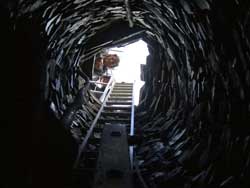

The Other Davis
The ME/CFS community got some tough news recently with the AHRQ report finding fault with most ME/CFS diagnostic and treatment trials. We had some good news, too, when we saw a top immune researcher at a top lab, Derya Unutmaz, applying cutting edge technology to ME/CFS patients. Now we have some more really good news with an article coming out of Stanford featuring Dr. Montoya and the other Davis at Stanford, Dr. Mark Davis, and the work his mega-immune lab is doing on ME/CFS.
- Check out Unumatz’s work here – HIV, Heart Disease, Diabetes… and Chronic Fatigue Syndrome? The Unutmaz Project to Decode ME/CFS
The article starts off with a devastating story of a semi-professional soccer player described as having “boundless energy” who, after coming down with a fever she never recovers from, becomes mostly bedridden. Two years later, her friends mostly gone, her health devastated, she’s described as “broken”. The former soccer player with boundless energy was described as “broken”.
Traveling from doctor to doctor she finally gets a diagnosis of Chronic Fatigue Syndrome (ME/CFS), and then postural orthostatic tachycardia syndrome (POTS) and makes it to Dr. Montoya’s office who says, “I want to make your life beautiful again.” (Few people can say something like that and make it work: Dr. Montoya can.)
Along the way we learn Dr. Montoya was advised he would wind up “in the gutter” if he pursued ME/CFS, but then a private donor gave him $5 million in 2008 to start his work. With many Stanford researchers now engaged in studying ME/CFS, he’s used the money well.
His biggest catch may have been Mark Davis whose Human Immune Monitoring Center hums with activity with its sixty (yes, sixty!) projects going on at same time studying everything from cancer to Alzheimer’s to aging.
Deep Profiling the Immune System
Mark Davis is looking DEEP into the immune systems of people with ME/CFS Recently we saw Unutmaz using his super-duper flow cytometer to study ME/CFS. Now here’s Mark Davis with his two uber time-of-flight CyTOF mass spectrometers that can measure forty different components within a cell and do that at a thousand cell a minute clip.
These $600,000 machines have enabled Davis’s Human Immune Monitoring Center to lead the way in deep-profiling the immune system. (One of the benefits to getting admitted to a University like Stanford is access to some of the best research tools in the world.
“Comprehensive, Rigorous and Quite Deep…”
In the article Dr. Lipkin described his approach to ME/CFS as being “comprehensive, rigorous and quite deep” – three adjectives that underscore his, Montoya’s, and Unutmaz’s approach to this illness. Forget Alzheimer’s, cancer, and aging; the biggest project right now at the Human Immune Monitoring Center is none other than Chronic Fatigue Syndrome.
Say good-bye to those 10 or 20 or 30 person per sample studies: Montoya’s sample size is 600 (200 ME/CFS patients and 400 controls) – large enough to finally capture the subsets in this disorder that have surely been mucking up study results for years. It will take Davis’s mighty immune center – the only one like it in the world – a year to run Montoya’s samples) through all the tests.
Suffice it to say we’ve never before seen a study this comprehensive, this rigorous, and this deep before. One would think biological biomarkers would be a natural outcome of research like this.
Somehow, from Ian Lipkin to Ron Davis to Mark Davis to Derya Unutmaz, ME/CFS has, with little help from biggest research funder in the world – the NIH (which does not fare well in this article) – has managed to make inroads in some of the top labs in the country. It’s hard not believe that within the next year or so we won’t know so much more about ME/CFS.
It’s hard to know how much an article like this impacts “the listening” of people at Stanford regarding Chronic Fatigue Syndrome, but my guess is that it must be large – particularly an article as well-written as this one is. This woman can really write! You can find her article (fifteen pages) here.It’s a long one – there’s much more in it –and please pass it around.
The “End ME/CFS” project Earlier we learned about the leader of the End ME/CFS team, genomics expert extraordinaire Ron Davis. Now we’ve gotten to know what Mark Davis, the leader of the immune side of the End ME/CFS project is all about.
The more we learn about the End ME/CFS effort the more special it becomes. Is Stanford going to eventually solve ME/CFS? They just might! Find out more about the End ME/CFS Project – “End ME/CFS” Mega Chronic Fatigue Syndrome Project Begins








